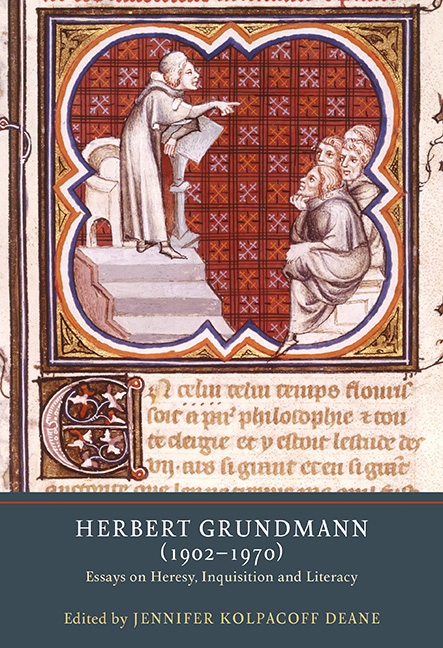Book contents
- Frontmatter
- Contents
- Acknowledgements
- Abbreviations
- Introduction
- Note on the Text
- 1 The Profile (Typus) of the Heretic in Medieval Perception
- 2 Women and Literature in the Middle Ages: A Contribution on the Origins of Vernacular Writing
- 3 Litteratus–Illitteratus: The Transformation of an Educational Standard from Antiquity to the Middle Ages
- 4 Heresy Interrogations in the Late Middle Ages as a Source-Critical Problem
- 5 Oportet et Haereses Esse: The Problem of Heresy in the Mirror of Medieval Biblical Exegesis
- 6 Learned and Popular Heresies of the Middle Ages
- 7 Obituary Essay (1970) by Arno Borst [annotations by Dr Letha Böhringer]
- 8 Bibliography of Herbert Grundmann
- Index
- YORK MEDIEVAL PRESS: PUBLICATIONS
Introduction
Published online by Cambridge University Press: 19 March 2020
- Frontmatter
- Contents
- Acknowledgements
- Abbreviations
- Introduction
- Note on the Text
- 1 The Profile (Typus) of the Heretic in Medieval Perception
- 2 Women and Literature in the Middle Ages: A Contribution on the Origins of Vernacular Writing
- 3 Litteratus–Illitteratus: The Transformation of an Educational Standard from Antiquity to the Middle Ages
- 4 Heresy Interrogations in the Late Middle Ages as a Source-Critical Problem
- 5 Oportet et Haereses Esse: The Problem of Heresy in the Mirror of Medieval Biblical Exegesis
- 6 Learned and Popular Heresies of the Middle Ages
- 7 Obituary Essay (1970) by Arno Borst [annotations by Dr Letha Böhringer]
- 8 Bibliography of Herbert Grundmann
- Index
- YORK MEDIEVAL PRESS: PUBLICATIONS
Summary
The historian, with all respect and understanding for the office, cannot permit this way of seeing – the form of questioning and judging that needs only decide between orthodoxy and heresy – to intrude if he wishes to understand the intellectual and religious life of that time in its variety of views, in its tensions and contradictions, and hence in its symptoms and causes of change. (Herbert Grundmann, ‘Heresy Interrogations’ [see p. 126 in this volume])
Over the nearly fifty years since his death in 1970, Herbert Grundmann’s formative influence on the field of medieval religious history has become increasingly evident. Renowned for his innovative and scrupulous research into the beliefs, ideas, practices and processes that shaped religious worlds from the twelfth to the sixteenth centuries, Grundmann revealed entirely new vistas of the medieval past. Generations of scholars have since approached their research from vantage points shaped by his arguments, whether those points of view were attained via personal contact, by reading his many publications or inherited through doctoral work and other secondary scholarship. Central to this gradually widening circle of influence were his German students, whom he mentored up until his death.
By the last decades of the twentieth century, this secular, source-based and cultural-historical approach had rippled through French, Italian, British and other European scholarship, producing in its wake research on a wide range of topics: monasticism, education, literacy, universities, theology, apostolic life, women's religious communities and expression, heresy and inquisition, popular or lay religious life, apocalyptic thought and prophecy and so on. American scholars inspired by Grundmann's methods soon generated their own studies of the medieval religious landscape, in turn introducing their own doctoral students to the ‘Grundmann’sche’ model. That Grundmann opened his door to foreign graduate students both at home and at the Monumenta Germaniae Historica suggests awareness of, and perhaps a sense of kinship with, these far-flung circles of medieval scholarship.
By the time of this publication, Grundmann's influence has been incorporated, whether consciously or not, into the research of hundreds of medievalists around the globe. Yet, for those without skill in reading German, the precise and subtle distinctions of Grundmann's arguments have been largely inaccessible. The 1995 English translation of his masterwork Religiose Bewegungen into Religious Movements of the Middle Ages was an invaluable contribution to that audience and generated new waves of engagement with Grundmann's complex and wide-ranging theses.
- Type
- Chapter
- Information
- Herbert Grundmann (1902–1970)Essays on Heresy, Inquisition, and Literacy, pp. 1 - 14Publisher: Boydell & BrewerPrint publication year: 2019

